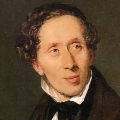
Eve's various children - Brothers Grimm
Eve's various children
A fairy tale by the Brothers Grimm
When Adam and Eve were driven out of Paradise, they were compelled to build a house for themselves on unfruitful ground, and eat their bread in the sweat of their brow. Adam dug up the land, and Eve span. Every year Eve brought a child into the world; but the children were unlike each other, some pretty, and some ugly. After a considerable time had gone by, God sent an angel to them, to announce that he was coming to inspect their household. Eve, delighted that the Lord should be so gracious, cleaned her house diligently, decked it with flowers, and strewed reeds on the floor. Then she brought in her children, but only the beautiful ones. She washed and bathed them, combed their hair, put clean raiment on them, and cautioned them to conduct themselves decorously and modestly in the presence of the Lord. They were to bow down before him civilly, hold out their hands, and to answer his questions modestly and sensibly. The ugly children were, however, not to let themselves be seen. One hid himself beneath the hay, another under the roof, a third in the straw, the fourth in the stove, the fifth in the cellar, the sixth under a tub, the seventh beneath the wine-cask, the eighth under an old fur cloak, the ninth and tenth beneath the cloth out of which she always made their clothes, and the eleventh and twelfth under the leather out of which she cut their shoes. She had scarcely got ready, before there was a knock at the house-door. Adam looked through a chink, and saw that it was the Lord. Adam opened the door respectfully, and the Heavenly Father entered. There, in a row, stood the pretty children, and bowed before him, held out their hands, and knelt down. The Lord, however, began to bless them, laid his hands on the first, and said, "Thou shalt be a powerful king;" and to the second, "Thou a prince," to the third, "Thou a count," to the fourth, "Thou a knight," to the fifth, "Thou a nobleman," to the sixth, "Thou a burgher," to the seventh, "Thou a merchant," to the eighth, "Thou a learned man." He bestowed upon them also all his richest blessings. When Eve saw that the Lord was so mild and gracious, she thought, "I will bring hither my ill-favoured children also, it may be that he will bestow his blessing on them likewise." So she ran and brought them out of the hay, the straw, the stove, and wherever else she had concealed them. Then came the whole coarse, dirty, shabby, sooty band. The Lord smiled, looked at them all, and said, "I will bless these also." He laid his hands on the first, and said to him, "Thou shalt be a peasant," to the second, "Thou a fisherman," to the third, "Thou a smith," to the fourth, "Thou a tanner," to the fifth, "Thou a weaver," to the sixth, Thou a shoemaker," to the seventh, "Thou a tailor," to the eighth, "Thou a potter," to the ninth, "Thou a waggoner," to the tenth, "Thou a sailor," to the eleventh, "Thou an errand-boy," to the twelfth, "Thou a scullion all the days of thy life."
When Eve had heard all this she said, "Lord, how unequally thou dividest thy gifts! After all they are all of them my children, whom I have brought into the world, thy favours should be given to all alike." But God answered, "Eve, thou dost not understand. It is right and necessary that the entire world should be supplied from thy children; if they were all princes and lords, who would grow corn, thresh it, grind and bake it? Who would be blacksmiths, weavers, carpenters, masons, labourers, tailors and seamstresses? Each shall have his own place, so that one shall support the other, and all shall be fed like the limbs of one body." Then Eve answered, "Ah, Lord, forgive me, I was too quick in speaking to thee. Have thy divine will with my children."
When Eve had heard all this she said, "Lord, how unequally thou dividest thy gifts! After all they are all of them my children, whom I have brought into the world, thy favours should be given to all alike." But God answered, "Eve, thou dost not understand. It is right and necessary that the entire world should be supplied from thy children; if they were all princes and lords, who would grow corn, thresh it, grind and bake it? Who would be blacksmiths, weavers, carpenters, masons, labourers, tailors and seamstresses? Each shall have his own place, so that one shall support the other, and all shall be fed like the limbs of one body." Then Eve answered, "Ah, Lord, forgive me, I was too quick in speaking to thee. Have thy divine will with my children."
* * * * *
Fairy taleBrothers Grimm
Translations:
 Die ungleichen Kinder Evas (German)
Die ungleichen Kinder Evas (German) Los desiguales hijos de Eva (Spanish)
Los desiguales hijos de Eva (Spanish) Eva's ongelijke kinderen (Dutch)
Eva's ongelijke kinderen (Dutch) I figli di Eva, uno diverso dall'altro (Italian)
I figli di Eva, uno diverso dall'altro (Italian) Неравные дети Евы (Russian)
Неравные дети Евы (Russian) Mỗi người một nghề (Vietnamese)
Mỗi người một nghề (Vietnamese) エバのふぞろいの子どもたち (Japanese)
エバのふぞろいの子どもたち (Japanese) Niejednakie dzieci Ewy (Polish)
Niejednakie dzieci Ewy (Polish) 夏娃的孩子们 (Chinese)
夏娃的孩子们 (Chinese) Havva'nın Farklı Çocukları (Turkish)
Havva'nın Farklı Çocukları (Turkish) Evas børn (Danish)
Evas børn (Danish) Os filhos de Eva (Portuguese)
Os filhos de Eva (Portuguese)
Compare two languages:


















